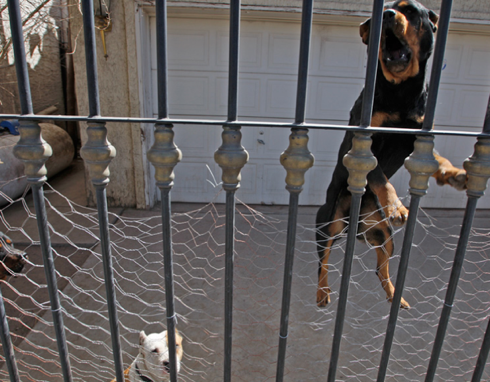Territorial aggression arises in a dog that is not keen with strangers on his property. This can be directed at dogs that walk by your house and yard on the daily walk or with guests that enter your home. Generally, dogs are territorial by nature/genetics, but the degree to which it occurs can be enhanced if the dog hasn’t been properly socialized as a young dog.

What causes territorial aggression in dogs?
Any breed of dog can exhibit territorial aggression, but it is often seen with a higher prevalence in breeds that are bred to more wary of strangers and more protective of home and property. Guardian breeds like Rottweilers and German Shepherds are naturally more protective. Herding breeds like the Great Pyrenees and Komondor are territorial by nature as well. Theirs is also instinctual/function oriented as they are bred with the task to protect their sheep flocks. It might be surprising (or not!) to learn that many small dogs also display territorial aggressive tendencies such as Dachshunds, Malteses and Shih Tzus.
If you become the owner of a breed of dog known for a possible territorial nature, it is imperative that you take the time to properly socialize your dog early on. He needs to meet as many people as possible so that he is very familiar with people. He needs to have visitors come to his house (such as having puppy parties) and positively interact with him so that he knows visitors to the house are a good thing.
It’s normally when a puppy hasn’t been fully socialized to a variety of people and had the experience of people coming to his home when he was young that the problem arises. That’s just because the dog is territorial by nature and then hasn’t been given the opportunity to understand how to handle people in or around his home.
What to do?
Assuming you’re past the point of young puppy/dog and socializing and you’re now to working through an issue, it is important to work through it well. As with other forms of aggression, it is always advised to consult with a professional, particularly if the aggression is severe, the dog has already bitten people, or you find yourself unable to control the situation.
Generally, a good deal of working with territorial aggression is partly management based and partly improving how your dog feels about guests to the home.
Management:
It is always best to not allow a territorial dog to greet guests at the door. This is a recipe for disaster as his level of impulse control will be very low at the entrance. Instead, there are options for not having him at the door. They include ideas like:
- Desensitizing him to the sounds that he associates with visitors whether that is mail coming in a slot, doorbell ringing, knocking on the door, etc.
- Teaching him to stay on a mat (until released by you) that is located away from the door. This takes a lot of control on the dog’s part and isn’t always advised if the dog has a severe aggression issue.
- Teaching him that when the doorbell rings, he runs to a different room for a reward. This can be done by you taking him to this room and rewarding him or using one of the remote rewarding devices such as Manners Minder. The dog either needs to stay in this room on command or have the door closed until you return to get him.
- Use of the leash (necessary if the dog has bitten guests before) when you return to get the dog to allow him to see the guests and get used to their presence before being allowed to greet.
Changing feelings about visitors
In addition to management techniques like those described above, it is a really good idea to change how the dog feels about guests. Like most dog behavior experts, I use techniques such as desensitization and counterconditioning so dogs can see new people to the home as a potential good thing.
Final thoughts
Some cases of territorial aggression respond very well to the methods above. Severe cases can be improved but may take more time and patience, but consistency will be required for all dogs.
Don’t let your guard down! Territorial dogs can often have issues with movement, so you may think he is doing well until your guest attempts to move. The severity of the issue will also be a factor here, and a professional can give you a solid training program to avoid any potential issues.
Lastly, a dog that lives in a home with children can pose a lot of issues if the home routinely has young children visiting. You will need to be super vigilant in these cases to avoid a bad experience for a young visitor.
